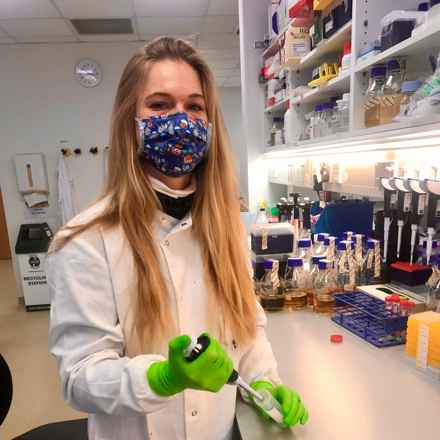Rare Disease Day 2023: Gene-editing for Stargardt disease a ‘step in the right direction’
Posted: Tuesday 28 February 2023
A PHD student believes that new gene therapy technologies could at some point pave the way for a treatment or a cure.
On Rare Disease Day Elena Piotter, a third-year University of Oxford PHD student who is working alongside professor of ophthalmology Robert MacLaren, shares her optimism for the project and the potential it has.
The research team in Oxford is using a technology called CRISPR to target specific errors in the faulty gene ABCA4, which is known to cause Stargardt disease.
The team hopes to correct the code, by targeting DNA and RNA so that enough normal ABCA4 protein is made to restore diseased macular cells to health.
Elena said: “This technology has really come to light in the last five years so it’s been pretty amazing how it rapidly keeps evolving and it’s an exciting project.
“What my lab and others labs like this are doing will at some point pave the way for a treatment or a cure. I think that is always the end goal, so my project is a small, tiny step in that but that is always the goal.”
The team will soon be using 3D structures to test their theories. “That will be the pinnacle of the project and hopefully that will yield some very cool results,” Elena said.
The outcome of what this all means remains unclear for now. Any success could lead to clinical trials further down the line but it is not known how people living with the condition at different stages would be affected.
Elena said: “A lot of things have been tried in the realm of gene therapy for Stargardt or inherited retinal diseases in general. Trying something new, something that’s targeted is really exciting. While it might not address every single person with Stargardt, it is a step in the right direction. . I think it’s important to try everything out there.
“I don’t think we know the exact potential yet. It’s unclear how well the editing had to work to have an effect. Ideally, if we could administer early enough you could prevent progression, that would be best-case scenario but we don’t know whether that would happen because we haven’t tested it at that point yet. I think it definitely has potential, CRISPR technology is used so widely that there will be a number of clinical trials which will continue to happen.”
Elena remains determined to find future treatments or a cure.
She said: “Research allows us to understand how these diseases work better, which will open up the possibility for more targets in terms of potential treatments and ideally finding a cure with continued research. Gene therapy provides an amazing realm of possibilities for that.”
The project, which is nearing its final year, was co-funded by the Macular Society and RetinaUK and Elena is grateful for the support to test new theories.
She added: “It’s an incredibly generous grant that has been given between the Macular Society and Retina UK so I’m really grateful for the funding. Research like this can’t happen without people’s donations so it’s incredibly important for the progress of the field and it paves the road for a treatment or cure. We couldn’t do it without you.”
Stargardt disease
Stargardt disease is a genetic condition caused by a tiny alteration in a single gene. It is the most common form of juvenile macular dystrophy.
Treatments
Read more about treatments available for patients with macular conditions, including wet AMD. Get expert insights from the Macular Society on the latest research into treatments.
Our research projects
Since 1987 the Macular Society has invested around £10 million in over 100 research projects.
Support for you
We provide free information and support to those with macular disease, along with their family and friends, to help people keep their independence.
Get the latest news and advice from the Macular Society
To hear about life-changing research, treatments and tips for living with sight loss, subscribe to our monthly enewsletter today. Together we can Beat Macular Disease.
Sign up to our free email newsletter





